Directors casting their spouses is as old as cinema itself, and one of the best modern teams has long been Chinese director Jia Zhangke and actress Zhao Tao. Starting with his 2000 film “Platform,” Zhao has been one of his regulars, and she established herself enough that she eventually started acting abroad, appearing alongside Maggie Cheung and Benedict Wong in Isaac Julien’s 2010 film “A Thousand Waves” and winning a prestigious David di Donatello award for the Italian drama “Shun Li and the Poet.” She returned to Jia’s films with 2013’s “A Touch of Sin,” the year after they were married. In Jia’s latest, “Mountains May Depart,” Zhao plays Tao, a woman seen in segments set in 1999 and 2014. She starts off bubbly and naive, but when we catch up with her 15 years later she’s weighed down by her bad decisions, including a failed marriage and a son who wound up moving with his father from her hometown in northern Fenyang to Shanghai. We spoke to both Jia and Zhao during the film’s appearance at last year’s New York Film Festival. RELATED: Review: “Moutains May Depart” is Jia Zhangke’s sneaky melodrama These films have long concerned the way technology is creating a disconnect between people, especially in China. As we see in the 2014 segment in the films, a lot of what you showed in films like “The World” seems to have come true. Jia Zhangke: Because of the fast pace of the society in China right now, the way we relate to our loved ones is very different. There’s a lot of separation. You’re rarely spending quality, meaningful time together, face-to-face. That’s why I put in that particular scene on the slow train — we somehow need to slow down sometimes. We’re texting each other or talking over Twitter or using emoticons. But these are just symbols; they can’t replace seeing someone’s reactions. This digitization, this simplification of human emotions means not a lot of people get to see our inner feelings anymore. Everything is superficial. In the future we might feel like an orphan abandoned because of the technology around us. RELATED: Review: “Ingrid Bergman in Her Own Words” is an intimate look at an icon Tao, can you talk about the difficulties of playing a character over a long period of time? Zhao Tao: I wanted to find specific characterization for each period and each age. For Tao in 1999, I wanted to portray her as someone who’s very pure, very naive, who only looks at the bright side of things. I raised my pitch when I spoke, so there was youth and vitality in my voice. I would be clapping, I would be jumping around. When she was in middle age I wanted to portray her without makeup. [Jia] said, “You need to realize your face will be in close-up on the big screen, in 4K. You’ll see everything.” But it just made sense. If she was going through a divorce and difficulties with her son, she wouldn’t be someone who wakes up every morning to put on her face. By showing my wrinkles, my freckles, it makes me more convincing. There seems to have been an evolution in the way these films have been shot. The actors used to be seen in group shots, but with these last two films the camera gets in closer, making a more direct, emotional connection with the characters. Has that changed how you as an actor perform? Zhao: I don’t think about if it’s going to be in long shot or a close-up. I just want to express the feelings of a particular character in the most authentic way possible, so everyone see it onscreen. How has your working relationship changed over the years? Jia: We didn’t have an intense working relationship on [our older films]. When she worked with other filmmakers, she became quite established as an actress. I realized she’s a very hard-working actress, very detailed in her methods. For this we would discuss her character and she would ask me questions I never thought of, didn’t know how to answer. For example, it was never mentioned what happened to her mother, whether she and her father got divorced or if she passed away. That’s an important part of how you relate to your father as a daughter, so it was a detail she had to fill in. She would ask me, for every scene, what time it’s taking place in — is it 10 in the morning, 2 p.m., 6 p.m.? Your behavior may change given what time of day it is. I admire that. RELATED: Review: “A War” is a deceptively simple soldier saga Tao is both a flesh-and-blood character and someone who represents and is affected by the dramatic changes in China over the last 15 years. Can you talk about that?
Zhao: She has something a lot women in China can relate to, which is how giving she is with her son, almost without any reservation. She has a sense of loyalty, a sense of duty, a sense of obligation. But she’s not a saint. She has her faults, her weaknesses, her regrets. She has this very mainstream idea that money can solve everything. She really believed her son’s best interest was to go with his father to Shanghai, to go to international schools, to go abroad. She wasn’t thinking that, 20 years later, her son would have all these emotional issues, a sense of alienation, a sense of feeling uprooted and adrift. Jia: A lot of that has to do with the language he speaks. For a son to lose the ability to speak the local dialect with his mother brings such a sense of isolation. The son speaks Shanghainese, which is the stepmother’s dialect, rather than Mandarin, which is what his mother speaks. Language dictates the way you see reality, so it makes him and his mother very removed from each other. Follow Matt Prigge on Twitter @mattprigge


















